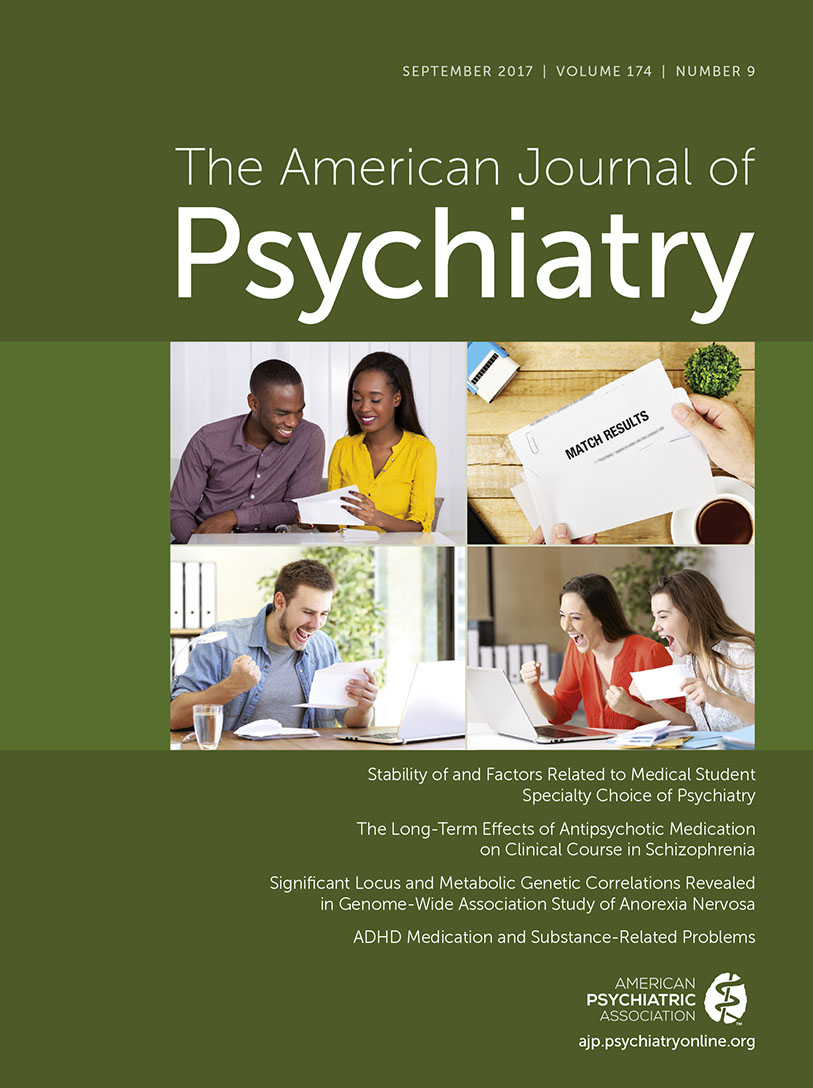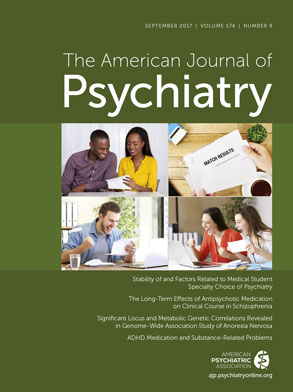Every one of us has been asked at one point why we went into psychiatry. Now we have answers that allow us to understand better the career decisions of recent cohorts of medical students. In this issue, Goldenberg et al. present an outstanding study of when and on what basis medical students considered psychiatry as their career choice (
1). In view of the pressing national need for high-quality mental health care and the modest rate of recruitment of U.S. medical students into psychiatry training programs, these observations are highly valuable (
2,
3). The recent increase is heartening, but in view of the historic trends over the past 20 years, it would be folly to be overly confident about this apparent upward trajectory (
4,
5).
Goldenberg et al. performed elegant analyses on a rich data set from the American Association of Medical Colleges that allowed them to examine patterns of recruitment into specialty programs. The authors offer two important observations that, while at first seeming contradictory, deserve attention. First, the percentage selecting psychiatry climbs from 1.6% to 4.1% as students progress through the 4 years of medical school. Only one other specialty, urology, had more students than psychiatry who switched into the field. Second, this trend coexists with an unmatched degree of stability, higher than for any other specialty choice, with 50% of medical students who selected psychiatry at the start of medical school not changing their plans.
Recognizing the specific factors predictive of a student selecting psychiatry is very useful to program directors. Not surprisingly, an excellent psychiatry clerkship appeared to be most influential (odds ratio=2.66). A weaker but related item was residents providing effective teaching during the clerkship. These are actionable items. Psychiatry departments can dedicate resources to ensuring that they have a well-designed and high-quality clerkship with effective teachers, role models, and mentors. The Association of Directors of Medical Education in Psychiatry and the American Association of Directors of Psychiatric Residency Training are well advised to use this convincing data to advocate for continuous improvement in clerkships. A steady flow of enthusiastic and talented residents yields immediate benefits in terms of patient care, faculty satisfaction, teaching for the next generation, and health care teamwork. Investments made in clinical education should result in a more robust subgroup of medical students applying to psychiatry programs. The direct return to any one department may be tempered, since students are sometimes well advised to pursue residency programs at academic medical centers other than where they attended medical school (
6, p. 127). Nonetheless, if most departments across the country strive to offer high-quality psychiatry clerkships, the recruitment dividends should be widespread.
The second most important factor was a college psychology major (odds ratio=2.58). The authors’ finding that an undergraduate major in psychology is predictive of matching in psychiatry is one that medical school admissions committee could act on but is outside the direct control of the psychiatry department. An admissions process that recognizes the value of knowledge in humanistic fields like psychology, based on the data from Goldenberg et al., should serve the long-term recruitment needs of psychiatry well. Upstream from the decisions of any medical school admissions committee lies the Medical College Admissions Test (MCAT), a test that until recently focused on biology, chemistry, and physics. The 2016 launch of a revised MCAT included more content from introductory psychology courses (
7). Over time these changes may encourage more students with an interest in psychology to consider medical school.
Medical students encounter an array of career paths that range from robotic surgery in urology to precise delineation of antibodies in transfusion medicine. Ideally, a medical student will select a specialty that facilitates personal growth and inspiration. The process by which students weigh their specialty options and explore what type of clinical encounter they find fascinating demands attention. Ideally, the emotional exhaustion, cynicism, and inefficacy that typify burnout will be less likely to develop if students discover a field that they find meaningful and well suited to their passions (
8). For the sake of our patients and communities, medical students need to make carefully considered career decisions. Hopefully the data in the Goldenberg et al. article will aid students, educators, and mentors in making these good choices.

